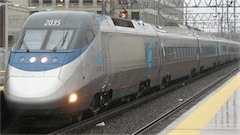Matthew Yglesias's Blog, page 2291
June 1, 2011
Breakfast Links: June 1, 2011
— I love the song, but I don't understand why we need a Girl With The Dragon Tattoo Remake.
— German nuclear phaseout likely to boost carbon emissions.
— I wish that instead of house price metrics we tracked land prices.
— Virginia's ghost prison.
— Why not make Tyson's Corner housing more affordable by allowing taller buildings?
— Among other things, this harrowing tale illustrates some of the absurdity of the idea consumer shopping power increasing the cost effectiveness of health care.
— Ryan Lizza on Romney's dilemma.


A Word On Commenting
If you don't want to comment using your Facebook account, you can comment using an account on Yahoo, Hotmail or AOL. To access these options, however, you need to log out of your Facebook account first and then re-try posting a comment. You'll see a drop-down menu for other log-in options.


May 31, 2011
Rising Chinese Wages Highlight Case For RMB Revaluation
Given the pace with which the Chinese economy has been growing, it should come as no surprise that Chinese workers are now seeing substantial wage increases while the multinationals who've learned to love cheap Chinese labor are fretting about its demise.
It also serves to highlight the fact that the PRC has ample reasons of self-interest to give in to American demands and stop undervaluing its currency. The idea of using currency manipulation to give your producers a cost advantage can work, but as a strategy, it has a natural time limit. Artificially low Chinese currency has created artificially high demand for Chinese-made goods which has created artificially high demand for Chinese manufacturing labor which is creating pressure for wages and eroding China's cost advantage. At the end of the day, they wind up in the same place they would have been with a floating currency — higher wages and reduced cost advantage—but a boatload of extra geopolitical animosity.


NE Corridor Privatization Neither Necessary Nor Sufficient To Fix Amtrak's Finances

By Matthew Cameron
Last week, House Transportation Committee Chairman John Mica (R-FL) announced that he will initiate legislation within the next two weeks that would put part of Amtrak on the auctioning block for private investors to claim. The motivation behind this proposal is to save taxpayers money by getting Amtrak's red ink off of the government's books. Mica's idea is hardly new, and details about the effects of privatization can be found in a 1998 Federal Railroad Administration report (pdf) that was produced at the request of a previous Republican Congress. The report's conclusions reveal something important that is rarely acknowledged about plans such as Mica's: They do not so much call for Amtrak privatization as they do for Amtrak elimination.
Amtrak's fundamental mission is to "operate a national rail passenger transportation system which ties together existing and emergent regional rail passenger service and other intermodal passenger service," according to the 1971 Rail Passenger Service Act. The rationale behind this objective is that intercity rail transit offers profound social benefits to the American public. It reduces air pollution and carbon emissions; relieves highway congestion; and potentially cuts down on suburban dwellers' work commutes, thus increasing the amount of time they can spend engaged in more worthwhile activities such as exercising or enjoying the company of their families.
Yet Mica's plan effectively would eliminate the national system of rail transit that presently exists. His plan involves soliciting bids from private companies to purchase Amtrak's infrastructure in the Northeast corridor and operate intercity passenger rail service within the region. As for the rest of the country, one of two things would happen. If operations were put up to bid as in the Northeast, then the private companies who assumed control likely would cut back on schedule and destination choices in an attempt to turn a profit. In other areas, rail might cease entirely due to a lack of bidders. For travelers, particularly those moving across multiple regions, this would result in "inconsistent reservation services, uncoordinated service times, and unnecessary gaps in service," according to the FRA report. Alternatively, the government could maintain control of passenger rail operations outside the Northeast corridor. That would require the continuation of federal rail subsidies, which is exactly what Republicans are trying to avoid.
Of course, Mica has not been bold enough to talk about what would happen to transit in the rest of the country, saying merely, "I believe that we have great potential in the Northeast corridor." But if Mica wants to invest in improved service on the profitable Northeast Corridor by cutting subsidies to the rest of the system, there are simpler and more transparent ways to achieve that than selling it.


Proportional Representation Can Ease Redistricting Woes
Washington, D.C. is currently mired in some controversy over the need for post-census redrawing of our Ward boundaries. I've also been reading some analysis of the new congressional district plan out of Democratic-controlled Illinois, and I'm anticipating looks of shock and horror when progressives see the maps Republicans come up with in Pennsylvania, Ohio, and Michigan. Then out will come the goo-goo brigades aghast to learn that members of Congress are representing funny-shaped districts.
At times like these, I always recall a conversation I once had with a law professor who told me she teaches proportional representation last in her class about district-drawing issues because it solves the problem too easily and the students need to learn.
Here's how it would work. The state of, say, Minnesota would need to elect eight House members. So everyone who wants to represent Minnesota in the House will run. Then the voters will rank as many candidates as they want, in order of preference. Anyone who gets more than 1/8th of the first choice votes wins. If that gets us fewer than 8 members of congress, we start doing two things. One is we redistribute "overvotes" from candidates who got more than 1/8th of the first preferences. The other is we start striking the candidates with the fewest votes off the list and looking at their second choices. Eventually, we'll have eight members of congress. Parties and pressure groups will endorse not just specific candidates, but specific preference orderings. So the Minnesota AFL-CIO and the Minnesota Sierra Club might rank their choices in different order even if they have the same eight favorite candidates. In this system, there's no such thing as a "safe seat" and no such thing as a gerrymander. If African-Americans show a strong inclination to cluster their votes and back a black candidate, then we'll have black members of congress without needing to conjure up special majority minority districts.
Really big states will still need some districts, of course, but the details of dividing Texas or California up into four or five big regions wouldn't have nearly the same scale of consequences.


Should Commerce And Labor Be Re-Merged?

Herbert C. Hoover Building
Pie in the sky reorganization of cabinet departments is a longstanding interest of mine, so I'm glad to learn from Michael Grunwald that Senator Richard Burr (R-NC) has a bill that would undue the 1913 measure that established separate departments of Commerce and Labor. Both agencies do an awful lot of statistics-gathering that could easily be put under a single roof, and other Commerce functions could be reassigned elsewhere:
Burr's bill would move NOAA to the Department of Interior, which is such an obviously sensible move I doubt it will ever happen. (Speaking of which, why is the Forest Service in the Department of Agriculture? Do we even need a Department of Agriculture?) It would also combine duplicative functions in the two departments, which currently function as quasi-competitors within the federal bureaucracy, except during Republican administrations, when the Labor Department barely functions at all.
As long as we're at it, we should scrap Agriculture. Programs like the Forest Service could join NOAA in Interior, nutrition assistance could go to Health and Human Services, food safety could go to the FDA, etc. The question, of course, is whether this kind of thing would make an actual difference. In the case of Commerce, it's a bit hard to say. The agency is kind of a grab-bag of functions, but I'm not sure that accounts for any concrete programs. With Agriculture it seems a bit clearer. There's an actual conflict of interest between being an agency whose mission is to improve nutrition and being an agency whose mission is to promote the interests of farmers.


44 GOP Senators Already Have Pledged To Filibuster John Bryson's Commerce Department Nomination

Acting Deputy Secretary of Commerce Rebecca Blank may not be getting the nod to run the department on a permanent basis, but it looks like it'll be a while before new boss John Bryson takes the helm. That's because even though Bryson's record is completely uncontroversial, there are 44 Republican Senators who have pledged to block the confirmation of any Commerce Secretary "until Obama submits for ratification trade agreements with Panama, Colombia, and South Korea."
The Obama administration favors those agreements, but has pledged not to ratify them until Congress reauthorized the Trade Adjustment Assistance program, a flawed but valuable initiative designed to mitigate the problems trade deals can cause for incumbent workers. Opponents of TAA, such as Sen. Orrin Hatch (R-UT), have taken to arguing that it can't be reauthorized "at a time when this country is basically broke." But not only is the country not broke, the essence of the case for free trade is that it's positive sum. Any given deal has an adverse impact on some people, but the gains should be large enough to make it possible to compensate them.


America May Need Fewer Teachers In The Future, But It Will Probably Want More
Steven Pearlstein wrote an interesting column over the weekend about the implications of ideas like Kahn Academy that seek to replace a lot of classroom time with video-watching, and then redirect teacher time into direct tutoring. He thinks this will lead to there being fewer, but higher paid, teachers:
If education moves to a teaching model in which students learn through online tutorials, exercises and evaluations created by a handful of the best educators in the world, then how many teachers will we need preparing lesson plans and delivering lectures and grading quizzes and tests? Surely we'll need some for one-on-one tutoring, or to run small group discussions, or teach things that can't or shouldn't be taught online. Despite assurances to the contrary, however, there's likely to be fewer than we have now — fewer but better-paid with more interesting jobs — just as has happened in nearly every other industry that has gone through a similar transformation.
I kind of doubt that. It's absolutely true that information technology means we'll "need" fewer teachers, but I'm not sure how much need really has to do with it. The evidence seems to me to suggest that we want lots of face-to-face attention. Consider the trend over the past forty years:

Both private schools and public schools are responding to the fact that parents want to send kids to schools with small class sizes. At the same time, we clearly don't "need" as many teachers as we currently have. Forget the internet, we got by with fewer in 1970. When I was losing weight, I worked with a personal trainer. I didn't "need" one-on-one attention to instruct me into how to lift the weights properly. But it's helpful to have someone standing there, paying attention, making sure you're doing it right, encouraging/cajoling you to continue, etc. And at gyms and yoga studious all across America you see that people like to take exercise classes with a human leader rather than learn on YouTube. It seems to me that the increasing popularity of television programs that have a cooking instruction component has led to an increase in demand for live cooking classes, not a decline.
Obviously public schools are government agencies. And people don't like paying taxes. So it may well be the case that we end up choosing to use information technology in the way Pearlstein suggests. But there are large education-esque sectors of the economy that don't have that publicly financed structure and consumer demand doesn't seem to me to evolve in this particular way.


Renaissance Art Hits The Internet
Renaissance Painting Online
Another New York museum visit took me to the Frick Collection where I saw some cool things happening with art and technology. They were able to use an infrared imaging technique to help reveal the "underdrawing" beneath Giovanni Bellini's St Francis in the Desert. And they were also able to use modern digital technology to put the presentation based on their work streaming on the Internet for all the world to see:
The internet is often discussed as a kind of lowbrowing, people are spending their time with lolcats instead of great art. And of course to an extent they are. But improved communications technology is a powerful lever for any kind of cultural pursuit. Lots of people around the world aren't able to travel to New York to see the artwork on display there, and there are lots of other cities with major art collections. People who want to seriously study painting have always had to rely on books and slideshows, extremely expensive media that really only suggest themselves to specialists. Now wide vistas are being opened to the world.


Cronocaos

In New York over the weekend, I saw an exhibit at the New Museum from Dutch architect Rem Koolhaas called Cronocaos that offers an essentially aesthetic critique of the burgeoning historic preservation movement. I'm a super-literal, not-at-all artistic person so I was occasionally frustrated with the rhetoric of the piece, but I think there are two key analytic points that you can pull out. One is that the growth of the preservation regime has been extremely rapid. It's purely a phenomenon of the past 200 years, until very recently was almost exclusively European in its purview, and was originally intended to protect structures that were thousands or hundreds of years old. Now mere decades suffice, the phenomenon is global, and the trend is to preserve ever-more.
In a curious way, this historicism is itself quite ahistorical. The mania for preserving the structures of the past is alien to the context in which many of these structures were erected. Which leads to the second core point, which is that what preservation preserves is not the actual past but the tastes of the present. That builds to the interesting proposal for Beijing that instead of designating certain favored works or hutongs noteworthy and preserved, that the city map itself into a grid and then randomly assign entire squares for preservation, thus ensuring the preservations of actual slices of an actual city rather than simply a momentary judgment about what is and isn't worthwhile in Beijing.
Here's more coverage on designboom, in The New York Times, and beyond.


Matthew Yglesias's Blog
- Matthew Yglesias's profile
- 72 followers



